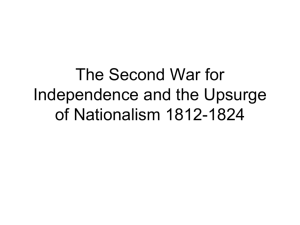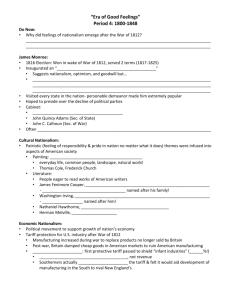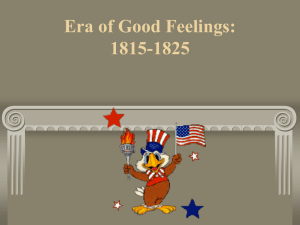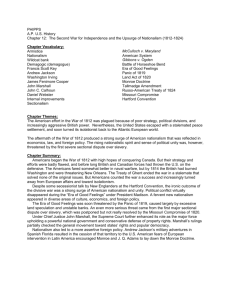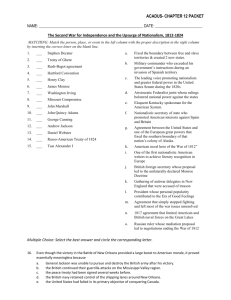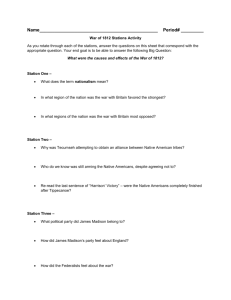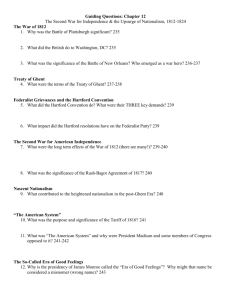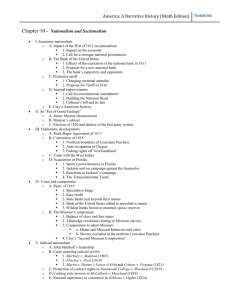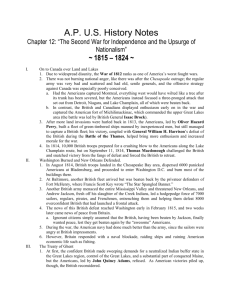Ch 12 Discussion
advertisement
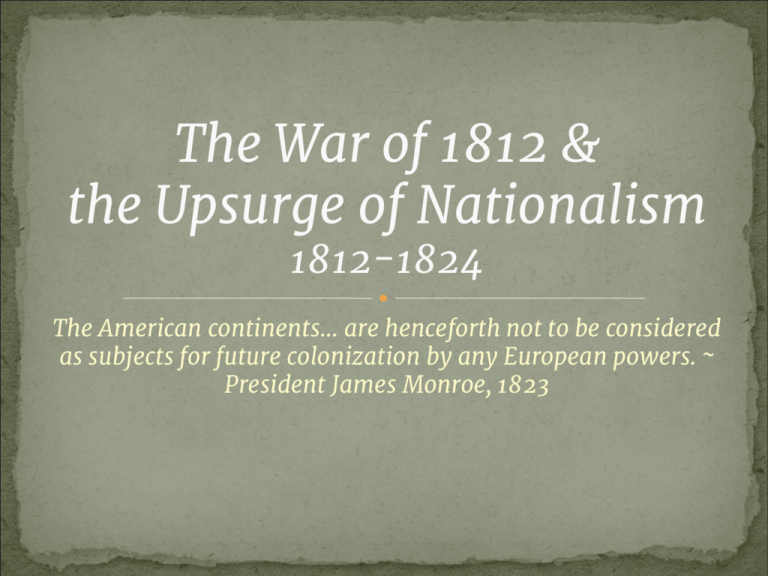
The War of 1812 & the Upsurge of Nationalism 1812-1824 The American continents… are henceforth not to be considered as subjects for future colonization by any European powers. ~ President James Monroe, 1823 AP Focus ● War vs. Britain for 2nd time in 30 years put serious strains on American economy, political system, and military. Treaty of Ghent didn’t really resolve anything other than agreeing to end the war. ● New England Federalists are strong opponents of the war, and actually consider seceding from the Union. ● After the war, a feeling of increased patriotism and nationalism sweeps nation. Era of Good Feelings. 2 AP Focus ● Henry Clay advocates the American System ● As US continues to expand westward, the question of what to do about slavery takes on an increasingly larger role. Sectionalism arises. ● 1823: Monroe Doctrine: warning to Europe that US will not tolerate further European interference in western hemisphere 3 The War of 1812 ● Heightened sense of nationalism ushered in the first meeting of Congress in 1811. ● New, young Democratic-Republican senators from the South and West urged war with Britain to secure a place in the global political structure for U.S. 4 ● “War hawks” such as Henry Clay from KY and John C. Calhoun from SC insisted that this war would finally clear Britain’s influence from North America ● Aside from dealing with the British at sea, Americans hoping to eliminate threat of Englisharmed Native Americans 5 APUSH rule #34: When in doubt, pick “Henry Clay” He will haunt you until midDecember! 6 Mr. Madison’s War ● Clashes with Indians in present-day Indiana caused many on the frontier to feel justified in the call for war. ● The British refuse to lift trade restrictions ● immense political pressure pushed President Madison to ask Congress for declaration of war in June 1812. ● “Mr. Madison’s War” ● New Englanders & Federalists had greatest opposition ● War hawks successful in amassing large enough coalition to officially declare war (Southern and Northern Democratic Republicans, Westerners on frontier) 7 Tecumseh and the Prophet 8 Tecumseh & the Prophet ● Shawnee Indian who grew up in the violent Ohio ● ● ● ● Country With his brother “the Prophet” (he once predicted an eclipse) he led a confederacy of Indians in the Ohio/Great Lakes region Supplied by the British, attacked Americans 1811: The Prophet defeated by William Henry Harrison’s army at the battle of Tippecanoe (Tecumseh was away, recruiting in the South) Tippecanoe and Tyler too 9 On to Canada over Land and Lakes ● Canada was an important battleground, British forces weak there ● Why attack Canada? End British influence over Native Americans in Great Lakes region ● US should have focused all efforts on Montreal, but instead split up forces into three: Detroit, Niagara, Lake Champlain 10 Bad military strategy in Canada (again) Rather than strike with full force directly at Montreal, the source of British power in Canada, American forces pursued a poorly conceived “divided invasion” strategy. Have we learned nothing from the French and Indian War? Always attack the capital!! 11 U.S. Looks for success on the Lakes ● American Navy led by ● ● ● ● Oliver Hazard Perry One of the best middle names ever Captured British fleet on Lake Erie “We have met the enemy and they are ours” “Don’t give up the ship!” 12 Perry’s victories / Battle of the Thames ● With the British fleet captured, Perry led an invasion of Canada from Detroit ● Met a British-Indian alliance and defeated them at the Battle of the Thames, 1813 ● British ran away early from this battle, Tecumseh and his warriors left in the dust, and were routed ● Tecumseh died in this battle and so did his confederacy 13 September 1814: Battle of Plattsburgh ● Next British attack was to come from Montreal South, in hopes of invading New York ● If British succeeded, this could have split the Union, as most people from NY to MA did not want any part of the war ● Luckily for the US, the British fleet was commanded by the amazingly inept Admiral Prevost. ● A smaller US naval fleet was able to outmaneuver the British at Plattsburgh, destroy their fleet, and send them back to Canada. 14 Washington Burned ● While Americans were able to repel British attack on New York, could not save Washington D.C. from being burned to ground in August, 1814 ● Capitol Building and White House burned down 15 Star Spangled Banner ● British amassed at Fort McHenry near Baltimore ● U.S. soldiers held the fort through night of bombing, inspiring prisoner of nearby British ship to write poem about it. ● Francis Scott Key put words to an old drinking song to express his love for his country and called it The Star Spangled Banner ● http://youtu.be/gQAnaZzNXDM 16 January 1815: New Orleans Defended ● General Andrew Jackson led southern troops. Able ● ● ● ● to cut through British from Alabama to New Orleans and thwart English attempt to control Mississippi River at Battle of New Orleans This battle, while an impressive victory for U.S., was completely unnecessary since it was fought 2 weeks after signing of peace treaty that ended war. Jackson emerged as American war hero Casualties: 2,000 to 70 Helped him become President later 17 Treaty of Ghent ● Ended War of 1812 ● Anglo-American peace urged by Russian czar, who wanted the British to focus on Napoleon in Europe ● Signed by US and British in Belgium on Christmas Eve, 1814 ● end of the fighting ● The return of any conquered territories to their rightful owners ● Settlement of boundary between Canada and U.S. that had been set before the war ● Essentially, war ended in a draw ● Neither side gained any concessions, restitutions or apologies 18 Reactions: Treaty of Ghent ● Most Americans pleased because they had fully expected to lose territory ● Despite their complaints, the war did allow for manufacturing, especially in New England, to flourish. ● Country became a bit more independent from European markets ● Turned out to be the beginning of America’s industrial revolution. 19 Federalist Grievances ● Serious ideological split divided nation during War of 1812: between Federalists (New England, high population density) and Democratic-Republicans (everybody else) ● NE vehemently opposed to war effort and direction Democratic Republicans were taking the nation ● Small minority at Hartford Convention (Conn., 1814) proposed seceding from Union ● = one of those conventions that didn’t amount to much but is always asked about on the AP test. 20 1814: Hartford Convention ● Demands of Hartford Convention: ● Abolish the 3/5 compromise (to reduce southern representation) ● Limit president to a single term ● Prohibit election of successive presidents from same state (3 of 4 presidents had been from ‘Virginia Dynasty’) ● Hartford envoys arrived to DC with their demands just as news of New Orleans victory reached town… then news of Treaty of Ghent ● Bad timing! Complaints seemed petty ● Biggest effect was the death-knell of the Federalist party, which would be wiped out by election of 1816 21 Recap of New England’s role in USA ● Colonies founded on (religious) freedom from Britain ● Birthplace of military activities in American Revolution ● ● ● ● ● ● – Boston Massacre, Tea Party, Lexington & Concord Home of John Adams, Sam Adams Elite, Federalist, wealthy merchants Pro Constitution & trade with Britain, anti French Rev. anti Jefferson, anti Madison, anti embargo Some merchants actually helped British during War of 1812 Now, talk of secession. Federalism not too popular right now. 22 Second War for Independence ● Even though the US gained nothing in terms of land, or any promises from the British to stop impressment, etc., it was a “coming of age” moment for US in terms of international diplomacy ● US announced it can stand toe to toe with the mightiest empire in the world, and has to be taken seriously ● Economically, forced US to become self-reliant, increased manufacturing 23 Nascent Nationalism ● Nationalistic spirit was the biggest product of War of 1812 ● New contributions in art, literature (Washington Irving & James Fenimore Cooper) ● 1816: Congress revives national Bank of United States ● Shut down during War of 1812, but again needed as debt mounted during war 24 Nascent Nationalism ● Tariff of 1816: passed by Congress to combat influx of cheap British goods ● British were having a “clearance” sale to get rid of goods that they weren’t able to ship to America for the past few years… at much cheaper prices than Americans could offer ● Tariff of 1816 added a 25% tax to certain British imports, encouraged Americans to buy “made-inAmerica” products ● Start of a protectionist trend. From now until Depression, tariff going to be a big deal 25 Henry Clay & The American System ● Grand scheme to make a profitable home market ● Three part system: ● 1. Strong banking system to provide abundant credit ● 2. Protective Tariff to help eastern manufacturing ● 3. Revenues from tariff would fund roads and canals in West. ● To improve transport of raw materials and manufactured goods throughout country. ● Remember, roads at this time were horrible – especially in the West, which gave this idea the most support. 26 Madison vetoes ‘American System’ ● 1817: Congress votes for $1.5 million in road improvements, but vetoed by President Madison – he & many Democratic-Republicans thought it was unconstitutional ● Many New Englanders also opposed this. (they had all the roads they needed) ● States forced to fund their own improvements, e.g. 1825 Erie Canal 27 Henry Clay This painting hangs in the corridors of the House of Representatives, where Clay worked as a glamorous, eloquent, and ambitious congressman for many years. Best known for promoting his nationalistic “American System” of protective tariffs for eastern manufactures and federally financed canals and highways to benefit the West, Clay is surrounded here by symbols of flourishing agriculture and burgeoning industries in the new nation. 28 The Era of Good Feelings ● With renewed sense of independence and national pride, Americans elected James Monroe as president in 1816. ● Monroe, a Democratic-Republican, destroyed the Federalist candidate with 183 to 34 electoral votes ● Dying gasp of Federalist party – ushered in an era of one-party rule ● His presidency called the “Era of Good Feeling” by a New England newspaper 29 The Era of Good Feelings? ● Somewhat of a misnomer ● National pride but also tensions ● Tariffs ● Slavery ● Sectionalism ● On the other hand, Monroe won reelection with every electoral vote but one (G. Washington) 30 Panic of 1819: Economic problems ● Usually countries experience inflation during wartime ● ● ● ● and then period of recession after war Hit hard by drop in demand for agricultural goods abroad and widening trade deficit with Britain Bank of US forced to demand payment from state banks in hard coin. Frontier banks had very limited amounts of coin due to high number of agricultural customers who had amassed large amounts of debt in loans. These western or wildcat banks could not pay back the BUS in hard coin, and the amt. of currency in circulation became very low 31 Panic of 1819 ● Panic of 1819 threatened Era of Good Feeling that ● ● ● ● ● Monroe had enjoyed his first presidential term deflation, depression, bankruptcies, bank failures, unemployment, soup kitchens, overcrowded debtors’ prisons Main cause was overspeculation in frontier lands Bank of US foreclosed mortgages on many western farms Poor western families hit hardest – would later become supporters of Jacksonian democracy Jackson would shut down the bank in 1833 32 Growing Pains of the West ● As country moves west, territories apply for ● ● ● ● ● statehood Conflict: US had had a balance in Senate between slave states and free states. Any new state would upset the balance with 2 new Senators Why all of the new people? “Soil butchering” of tobacco drove farms westward. New land open with victories over Indians Land Act of 1820: cheap land for settlers 33 Slavery and the Sectional Balance ● Sectionalism: tensions between sections of country ● Slave south, free North, new West – all have their own ● ● ● ● ● interests 1819: Missouri applies for admission to statehood House of Reps passes “Tallmadge Amendment” saying that if Missouri becomes a state, slavery cannot continue there Population of North is becoming larger and larger Tallmadge Amendment defeated in Senate While North had advantage in House of Representatives, N&S (free & slave) were equal in Senate, 22 Senators for each type 34 1820: Missouri Compromise ● If Missouri were made a free state, would that mean ● ● ● ● ● all new states would be free? Would Congress try to outlaw slavery in the old South? The South had to keep the Senate balanced to keep slavery New states in southern half of the frontier justified slavery by expressing economic need for large, stable workforce Those settling North had no economic need for the enslaved Henry Clay played leading role in the Missouri 35 Compromise 1820: Missouri Compromise ● Admit Missouri as a slave state ● Cut off Maine from Massachusetts (New Hampshire was already in the way) and make it its own state ● 2 new states, one free, one slave ● BUT – future states (north of 36° 30’) in Louisiana Territory would all be free states 36 37 Effects of Missouri Compromise ● North and South would play nice for another 34 years ● Eventually, outrage over “the peculiar institution” would reach a boiling point – and lead to Civil War ● Missouri Compromise put a bandaid on the problem ● Allowed US to become stronger before it fought itself in Civil War – and likely allowed it to survive a civil war 38 Thomas Jefferson on this issue The Missouri question… is the most portentous one which ever yet threatened our Union. In the gloomiest moment of the revolutionary war I never had any apprehensions equal to what I feel from this source… this momentous question, like a fire bell in the night, awakened and filled me with terror…. [With slavery] we have the wolf by the ears, and we can neither hold him, nor safely let him go. ~ Thomas Jefferson, 1820 39 John Marshall and Judicial Nationalism 40 John Marshall and Judicial Nationalism ● Chief Justice of Supreme Court – during career he significantly increased the power of the federal government (he was a Federalist) ● 1819: McCulloch v. Maryland – denied Maryland the right to tax the Bank of the United States ● “Loose construction” – Constitution derives from the people and thus permits the gov’t to act for their benefit ● All means that are appropriate and not prohibited by, but consist with, the letter and spirit of the Constitution are constitutional [paraphrase] 41 John Marshall and Judicial Nationalism ● 1821: Cohens v. Virginia – Supreme Court asserts its right to review the decisions of state courts in all questions that involve federal government ● 1824: Gibbons v. Ogden – denied New York the right to give a monopoly to a steamboat company that did business in NY & NJ. Interstate commerce is for federal government only. ● Somewhere, in the distance, applause is heard coming from the grave of Alexander Hamilton 42 Sharing Oregon ● Treaty of 1818: US and Britain agree on Northern border (Canada), as well as a 10-year “joint occupation” of Oregon ● In other words, we both claim the land, but as none of us actually live there, let’s agree not to fight about it for at least 10 years 43 Acquisition of Florida ● Revolutions in South America: Argentina 1816, Venezuela 1817, Chile 1818. ● Americans naturally supportive of independence against monarchies ● Spain has its hands full, and is vulnerable 44 Acquisition of Florida ● 1818: On pretext of fighting the Seminole Indians and hunting runaway slaves, Andrew Jackson leads army through Florida and just happens to also capture two Spanish forts ● Seminoles split off from Creek Indians, who had been allied with Britain in War of 1812, and had fought Jackson in South. 45 Acquisition of Florida (continued) ● Jackson’s actions in Florida seriously overstepped his bounds ● Cabinet member John Quincy Adams (son of John) decided to take these actions and use it to the US’ advantage ● As Spain was so tied up with revolutions in South America, why not demand Florida from them? They certainly can’t defend it ● 1819 Florida “Purchase” / Adams-Onís Treaty: US gains all of Florida, Spain cedes claims to Oregon. U.S. abandons claims to Texas, which becomes part of Mexican province… (2 years before Mexicans win independence from Spain) 46 Meanwhile, around the Globe… ● European monarchies restore control in Europe. ● ● ● ● Rebellions put down in Italy and Spain Russians claim Alaska and expand into California Rumors of Euro monarchs sending forces to put down Latin American rebellions and restoring control to King of Spain Britain controlled seas, benefitted from Latin American trade, supported revolutions British proposal to US to join forces to prevent Europe from invading new Latin American republics 47 Don’t do it!!!! 48 Background of Monroe Doctrine ● John Quincy Adams saw through British proposal ● British only worried US would take Cuba and be a threat to British West Indies – this alliance would prevent that ● If America did nothing, Britain’s powerful Navy would still prevent continental Europeans from invading Latin America ● So why agree to anything that would tie the hands of US? 49 Monroe Doctrine ● Delivered by president in 1823. Became basis of ● ● ● ● U.S. foreign policy Never an actual law Called for European noncolonization (directed at Russia) and nonintervention in Latin American Era of colonization is over, if you disagree, just try us… While U.S. did not have military means to enforce the doctrine in its early years, they knew that no European Navy could beat British 50 Monroe’s Doctrine Appraised ● Latin American reaction: Most did not even know it happened. Those who did knew British were real enforcers of the seas ● Most famous of all post-1812 nationalism ● Supported patriotism and isolationism ● Increased America’s reputation on global stage 51 Crash Course ● http://www.youtube.com/watch?v=qMXqg2PKJZU 52
